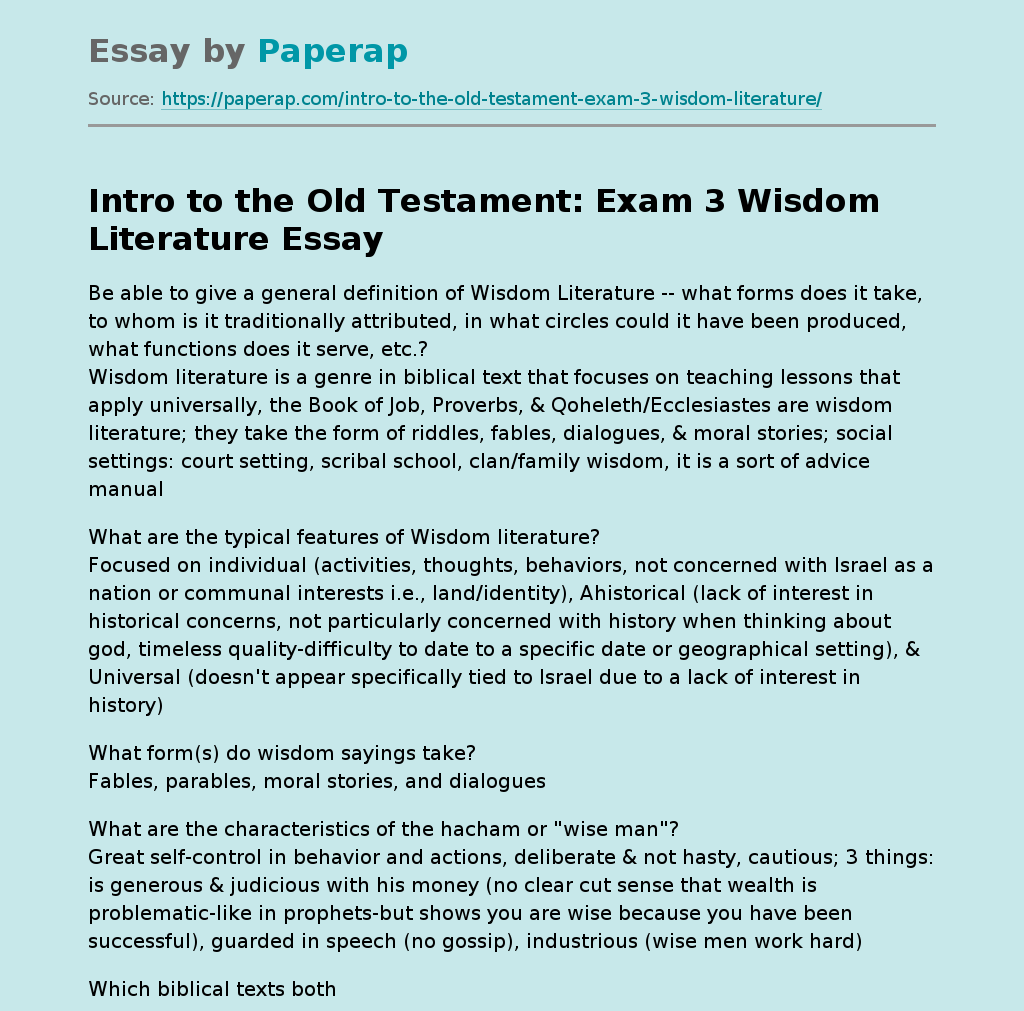Intro to the Old Testament: Exam 3 Wisdom Literature
Essay,
Pages 4 (866 words)
Views
73
Be able to give a general definition of Wisdom Literature — what forms does it take, to whom is it traditionally attributed, in what circles could it have been produced, what functions does it serve, etc.?
Wisdom literature is a genre in biblical text that focuses on teaching lessons that apply universally, the Book of Job, Proverbs, & Qoheleth/Ecclesiastes are wisdom literature; they take the form of riddles, fables, dialogues, & moral stories; social settings: court setting, scribal school, clan/family wisdom, it is a sort of advice manual
What are the typical features of Wisdom literature?
Focused on individual (activities, thoughts, behaviors, not concerned with Israel as a nation or communal interests i.
e., land/identity), Ahistorical (lack of interest in historical concerns, not particularly concerned with history when thinking about god, timeless quality-difficulty to date to a specific date or geographical setting), & Universal (doesn’t appear specifically tied to Israel due to a lack of interest in history)
What form(s) do wisdom sayings take?
Fables, parables, moral stories, and dialogues
What are the characteristics of the hacham or “wise man”?
Great self-control in behavior and actions, deliberate & not hasty, cautious; 3 things: is generous & judicious with his money (no clear cut sense that wealth is problematic-like in prophets-but shows you are wise because you have been successful), guarded in speech (no gossip), industrious (wise men work hard)
Which biblical texts both are examples of Wisdom literature while at the same time repudiate some of the central tenets of traditional wisdom teachings and literature?
Qoheleth-“vanity is emptiness,” Qoheleth says no retributive justice, very negative about life, very negative at the beginning; Job-no retributive justice, Job was a good person & still got punished
In general, what are the features of God that are emphasized in Wisdom literature?
Divine order-god has established cosmic order; retributive justice-it’s talked about in proverbs & in Job & Qoheleth, it is rejected
Do the examples of Wisdom Literature in the Bible seem particularly Israelite to you? What elements of traditional Israelite theology do you see in some aspects of Wisdom? What traditional aspects of Israelite religion and theology seem to be missing, in general, from Wisdom Literature?
Not really-much of the wisdom literature rejects retributive justice; proverbs have pithy sayings, “you should do this, but you shouldn’t do this” in some of it they use symbols to represent it, not as much about religion in some of the wisdom literature
How does female imagery and references to women function in Proverbs (positively and negatively)?
Male audience, gendering of wickedness (sexual temptation), wisest thing you can do is choose a good wife; Proverbs 8 (Lady Wisdom)-one of the most famous proverbs, presents wisdom clearly as a female figure, created before anything else (at creation); Proverbs 31 (Virtuous Wife)-good wife is more precious than jewels, having a good wife is a marker of your wisdom, don’t just pick for beauty
To whom is Proverbs directed?
Wisdom is conceptualized as female-clear that audience is intended to be young men, language of a father giving advice to a son
Why do some scholars characterize Proverbs as a fairly “traditional” or “conservative” example of Wisdom?
Most conservative wisdom book, deals with past Israelite wisdom & culture by talking about what you should and shouldn’t do-doesn’t go into depth like other wisdom literature
How do the form and structure of Job complicate the interpretation of the text?
2 parts: prose frame story & poetic dialogues
Job deals with the problem of undeserved evil; there are several “answers” or explanations given in Job for why he, a good man, has such tribulations.
What are the various explanations? In which portions of the text are the different explanations given? Who offers them?
The Speech from the Whirlwind→ god’s explanation for why he did this to job (blameless, innocent suffering), Divine attack on the limits of human knowledge, it’s a copout-not an answer (elie weisel), theologically troubling, Job’s 3 friends give explanations too
In what ways is Job a response/reaction/repudiation(?) to the traditional notions of retributive justice that we have seen in the prophetic texts?
The concept of retributive justice is that the good are rewarded and the bad are punished, In Job the opposite happens-Job, though good, is punished
Who is Qoheleth?
Qoheleth (Hebrew name)=Ecclesiastes (English word-term means preacher, more appropriately teacher or assembler of wisdom)
What does Qoheleth mean by his use of the term “vanity”?
“Hevel”=vanity-ephemmality, sometimes translated as emptiness-book of Qoheleth talks about vanity
Traditionally, many readers have despised the book of Ecclesiastes/Qoheleth, thinking it to be pessimistic and irreligious. What is your assessment of the book?
Some truth in it
Qoheleth seems at some points to be questioning the very meaning and purpose of human existence. What aspects of human life and experience lead Qoheleth to question whether there is any purpose or meaning to life?
Working really hard for nothing-no one is going to remember you when you die, why did you do all of this hard work? human life isn’t permanent-the only truth is that there is death, good & evil people both die, so what’s the point, pursuit of wisdom, in response to this pointlessness of life, enjoy the little things (such as eating & drinking)
Intro to the Old Testament: Exam 3 Wisdom Literature. (2019, Feb 04). Retrieved from https://paperap.com/intro-to-the-old-testament-exam-3-wisdom-literature/

